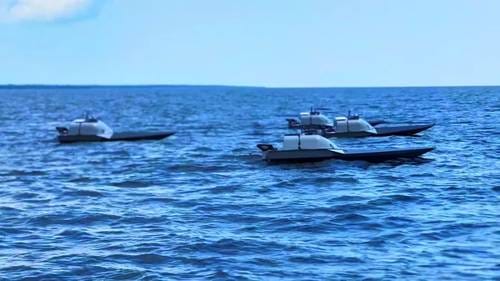Deep Tech Briefing #31: 🧠 Anthropic in Talks for $40B Valuation; 🚢 Autonomous Uncrewed Surface Vessels; 🌀 Millions Invested in Rare Earth Recycling 🌟 Glass Quantum Photonic Chips and more..
An insider’s update on Deep Tech Ventures: Your dose of tech innovations, startups, exponential industries, policies, and market moves to stay ahead and capitalize on it.
Welcome to this edition of Deep Tech Briefing, our Sunday column where we break down the week’s top developments in Deep Tech Startups and Venture Capital.
Subscribe for free to get it straight to your inbox every Sunday, and read it whenever you like!
✨ For more, see Membership | Partnership | Deep Tech Catalyst
✨ How Can We Help?
Learn from the Best: Join our masterclasses to get ahead in deep tech venture capital. From due diligence and value chains to policy insights and startup case studies, we’ll arm you with the tools you need to succeed. Unlock Premium
Get in Front of the Right People: Reach a global audience of 14,000+ deep tech founders, investors, and operators. Partner with us to showcase your startup, fund, or ideas to a community that’s ready to engage. Learn more.
Showcase Your Startup: Building something groundbreaking? Let us help you share your story and connect with the right partners, investors, and customers. Join us here.
Let’s build the future, together!
In today’s edition
Anthropic Eyes $40 Billion Valuation in Funding Talks
Autonomous vessels powered by AI offer a new frontier in maritime
Millions flow into rare earth recycling to secure future tech supply
AI-driven robotics simulation technology speeds up industrial automation
Quantum photonic chips on glass push the boundaries of computing.
🧠 Anthropic Eyes $40 Billion Valuation in Funding Talks: Weighing the Value of Ethics in the AI Industry
Anthropic’s latest valuation discussions have sent ripples through the tech industry. With a piece this Monday on The Information suggesting that the AI startup "has started talking to investors about raising capital in a deal that could value the startup at $30 billion to $40 billion," the stakes for the artificial intelligence ecosystem are higher than ever. As the AI arms race intensifies, what does this signal for the future of tech giants, the startups vying for attention, and the broader market grappling with these eye-popping valuations?
Anthropic's rapid ascent is not surprising given its pedigree. Founded by former OpenAI executives, the company positions itself as an ethical alternative to more commercialized players in the space. Their emphasis on safety, transparency, and aligning AI systems with human values taps into an undercurrent of concern within both the tech community and society at large: how do we develop AI systems that enhance human welfare without causing inadvertent harm? In a way, Anthropic is positioning itself as a counterweight to the broader fears of unchecked AI progress, a company that blends ambitious technological growth with responsible development practices.
The valuation that Anthropic is reportedly exploring is jaw-dropping, especially when compared to more established players in the tech and AI sectors. Just a few years ago, valuations of this magnitude were reserved for firms with substantial revenue streams and well-established business models. Anthropic, by contrast, remains a relatively new player, albeit one with strong momentum and deep-pocketed backers like Google and, more recently, Amazon.
The proposed $40 billion valuation, if realized, would place Anthropic among the highest-valued AI startups globally. This raises an important question: is Anthropic’s perceived value based on its technological promise, its ethical stance, or the mere fact that the race for AI dominance is so hot that also emerging companies can command such eye-watering figures?
Surely, investment in AI safety is not only a moral imperative but also a strategic one. As governments and regulatory bodies begin to impose stricter guidelines on AI implementation, companies that have already integrated ethical considerations into their development processes could have a competitive advantage. Therefore, the high valuation could be seen as a bet on the company's future compliance and alignment with emerging regulatory frameworks.
In any case, with a great valuation come great expectations. Anthropic's high morality and focus on safe AI development will likely face the classic tension between profitability and ethics. Investors putting money into AI expect not only groundbreaking technology but also returns. If Anthropic expands its operations while maintaining its ethical integrity, it could become a model for how to run a responsible AI business. But if it faces pressure to prioritize rapid growth over safety, it could undermine its core mission.
The world of artificial intelligence has always been a realm of rapid innovation and exponential growth. Its applications range from healthcare diagnostics to autonomous vehicles, from personalized marketing to complex data analysis, to defense.
The allure for investors is clear: artificial intelligence has the potential to redefine industries, create new markets, and generate unprecedented economic value, and the high valuations reflect this optimism. However, they also raise questions about market exuberance. Do these figures reflect intrinsic value, or are they symptomatic of a bubble fueled by hype and speculation? The tech industry has witnessed similar scenarios in the past, where inflated valuations were followed by market corrections. We'll see..
In the end, the true measure of success for any deep tech company, and AI in this case, will not be its valuation but the positive impact it has on the world. By focusing on innovation, ethics, and collaborative progress, we can harness the full potential of artificial intelligence to tackle some of the most urgent challenges of our time.
🚢 End-to-End Maritime Autonomy Solutions Company Set to Revolutionize Autonomous Uncrewed Surface Vessel Operations
Autonomous surface vessels (USVs) are poised to be transformative in sectors ranging from defense to environmental monitoring, representing a shift from traditional, manned maritime operations that are often costly and logistically challenging. In environments where the stakes are high, such as naval missions or offshore energy exploration, the need for continuous, risk-free operations becomes crucial. USVs meet this need by facilitating operations in remote or hostile regions, significantly reducing both the financial and human costs involved.
Recent initiatives like the U.S. Navy's Replicator program and the Chief of Naval Operations' Project 33 underscore the increasing reliance on autonomous systems for critical future missions. The broader maritime industry, which plays a vital role in global commerce, is also on the cusp of a major shift with the adoption of autonomous technologies. Given that human error contributes to approximately 75% of maritime accidents, leading to substantial financial losses each year, the integration of autonomous systems could greatly enhance safety and operational efficiency.
However, the current generation of USVs is not without challenges. Many are prohibitively expensive and depend on complex infrastructures for deployment. Scalability poses another significant issue, as existing systems often struggle to manage large fleets from a single control station. Moreover, the landscape of technology providers is fragmented; hardware, software, and control systems frequently come from different sources, complicating integration efforts and raising costs and malfunction risks.
In this landscape,





